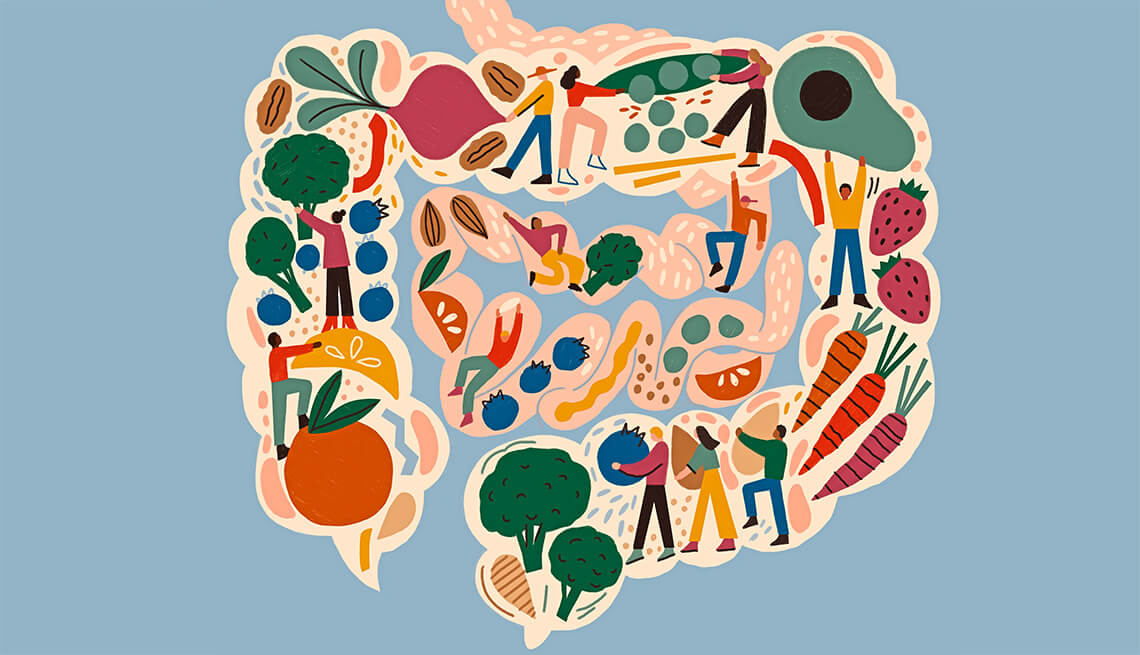Gut Health: Why Fiber, Prebiotics, and Probiotics MATTER!
Helping and healing your gut does not have to be hard. By understanding which nutrients to consume and how much, you can get your gut bacteria back to a balanced state. You can even prevent disease and illness with adequate consumption of fiber, prebiotics, and probiotics daily!

Your brain is always ON! It is in charge of your thoughts and emotions, physical movements, breathing and heartbeat, and all senses. This means your brain requires a constant supply of fuel and that "fuel" comes from the foods you eat. Consuming high-quality food and nutrients, or those high in important vitamins, minerals, and antioxidants, nourish the brain and protect it from oxidative stress, or the free radical waste produced when the body uses oxygen, which can damage cells. And of course, these nutrient-dense foods nourish our digestive tract, sending the broken-down nutrients to the different systems of the body for cell growth and repair, for healthy bacteria growth in the gut, to strengthen muscle tissue, and for protection of one’s bones.
The gut is an important organ with digestive and immune regulatory functions that consistently maintain the microbiome ecosystem. The gut microbiome cooperates with the host to regulate the development and function of the immune, metabolic, and nervous systems. The gut closely connects with the central nervous system through dynamic bi-directional communication along the gut-brain axis. Microbial changes in the gut can influence brain physiology and behavioral cognitive functions. And it is said that the second brain is in the gut! So, what foods are protectant of both brain and body? Let’s dive into it!
Fiber is important for maintaining digestive health. The American Heart Association suggests that total dietary fiber intake should be 25 to 30 grams per day from food, not supplements. Fiber helps to prevent constipation by adding bulk to the stool and increasing the frequency of bowel movements. This can help to prevent the development of hemorrhoids and diverticular disease, which are conditions that can occur when the colon becomes inflamed or swollen. Additionally, fiber is important for regulating blood sugar levels. Soluble fiber, which is found in oats, beans, and some fruit can slow down the absorption of sugar into the bloodstream. This can help to prevent spikes in blood sugar levels, which can be harmful to people with diabetes. Fiber is also important for maintaining heart health. It can help to lower cholesterol levels by binding to cholesterol in the digestive tract and removing it from the body. This can help to reduce the risk of heart disease, which is the leading cause of death worldwide. Foods high in fiber include beans, lentils, chia and flax seeds, apples, sweet potatoes, oatmeal, and avocados.
Probiotics play a crucial role in maintaining a healthy gut and overall well-being. These beneficial microorganisms, commonly referred to as "good bacteria," have numerous health benefits and are essential for proper digestion, immune function, and nutrient absorption. Understanding the importance of probiotics and incorporating them into our diet is essential for promoting optimal health. Probiotics support digestive health by helping break down food, aiding in nutrient absorption, and preventing harmful bacteria from thriving in the gut. They assist in maintaining a balanced gut microbiota, which is essential for a healthy immune system. Probiotics have been linked to improving mental health, reducing inflammation, and even enhancing weight management. While probiotics can be taken in supplement form, it is always preferable to obtain them through natural food sources. Foods that are natural probiotics are fermented foods like pickles and kimchi, yogurt, buttermilk, and kombucha.
Prebiotics are nondigestible compounds that essentially act as food for the gut microbiota. They are also known as prebiotic dietary fibers and support digestive health. Some of the health benefits of prebiotics include increases in Bifidobacterium and Lactobacilli, production of beneficial metabolites, increases in calcium absorption, decreases in protein fermentation decreases in pathogenic bacteria populations decreases in allergy risk, effects on gut barrier permeability, and improved immune system defense. Foods that are naturally occurring prebiotics are bananas, apples, oats, asparagus, leeks, soybeans, chicory root, garlic, and onions. It is important to remember that prebiotics feed the probiotics and the bacteria already present in the gut! Prebiotics and probiotics tend to work together to maintain adequate gut health.
The function of your gut is vast. Understanding how your gut microbiome works as well as what can help it work better can be overwhelming at first. By incorporating fiber-rich foods and both prebiotics as well as probiotics into one’s diet, improvement of your gut health and, truly, your overall wellbeing.
References:
- Fu, J., Zheng, Y., Gao, Y., & Xu, W. (2022). Dietary Fiber Intake and Gut Microbiota in Human Health. Microorganisms, 10(12), 2507. https://doi.org/10.3390/microorganisms10122507
- Hemarajata, P., & Versalovic, J. (2013). Effects of probiotics on gut microbiota: mechanisms of intestinal immunomodulation and neuromodulation. Therapeutic advances in gastroenterology, 6(1), 39–51. https://doi.org/10.1177/1756283X12459294
- Holscher H. D. (2017). Dietary fiber and prebiotics and the gastrointestinal microbiota. Gut microbes, 8(2), 172–184. https://doi.org/10.1080/19490976.2017.1290756
- Ochoa-Repáraz, J., & Kasper, L. H. (2016). The Second Brain: Is the Gut Microbiota a Link Between Obesity and Central Nervous System Disorders?. Current obesity reports, 5(1), 51–64. https://doi.org/10.1007/s13679-016-0191-1
The function of your gut is vast. Understanding how your gut microbiome works as well as what can help it work better can be overwhelming at first. By incorporating fiber-rich foods and both prebiotics as well as probiotics into one’s diet, improvement of your gut health and, truly, your overall wellbeing.




